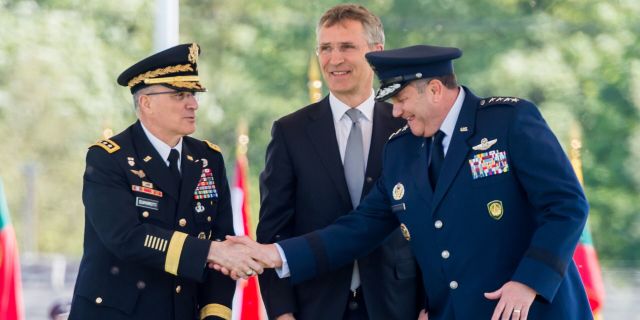The center of gravity of the conflict in Ukraine has shifted to the Black Sea, the author of the article for The Hill believes. He is confident that the next step should be for the West to help the Ukrainian Armed Forces attack the Crimean Bridge. Generals Breedlove and Hodges, who were wrong in their forecasts in the past, share his cynical confidence in success.
The Prussian military theorist Karl von Clausewitz once wrote that "the talent of a strategist is to identify the decisive point and concentrate everything on it." President of Ukraine Vladimir Zelensky began the new year by emphasizing this point in an interview with The Economist magazine, stressing that Crimea and the Black Sea will now become the focus of attention of the Armed Forces of Ukraine. The isolation of Crimea and the weakening of the Russian armed forces stationed there "are extremely important to us because it is a way to reduce the number of attacks from this region," Zelensky said.
Although Ukraine may not have managed to achieve a decisive breakthrough on land in 2023, the war at sea was a resounding success. Ukraine was able to deal a serious blow to the Russian Black Sea Fleet thanks to the incessant naval and air attacks, which used British-made naval drones and Storm Shadow cruise missiles. As a result, the Russians were forced to take refuge in their naval bastion in Sevastopol. After the recent damage to the landing ship Novocherkassk at the end of December, British Defense Minister Grant Shapps welcomed the success of this action, saying that Russia had lost 20% of its Black Sea Fleet in just the last four months.
Ukraine has effectively lifted the Russian naval blockade of Odessa and resumed the export of grain and other raw materials from this strategic Black Sea port. U.S. Ambassador to Ukraine Bridget Brink said that "since August, 400 ships with 13 million tons of cargo have passed through the Black Sea Humanitarian Corridor. This is a significant achievement, and Ukraine continues to feed the world."
The main "prize" is Crimea
The next step on the Black Sea for the West will be to help Kiev in its offensive against Crimea, whose annexation by Russia in 2014 is considered illegal in the West. Another task is to cut the Russian logistics line providing its armed forces operating in the south of Ukraine. Two retired American generals have repeatedly stressed the need to help Ukraine achieve this goal. According to Ben Hodges, the former commander of the US army in Europe, if successful, Crimea could become a "decisive theater of military operations." Philip Breedlove, former supreme commander of NATO's joint armed forces in Europe, echoed Hodges' thought, stressing: "If we give Ukraine the opportunity to strike Crimea — on a large scale, persistently and accurately — Russia will be forced to rethink its strategy there. We need to hit all Russian forces in Crimea, hit them constantly and destroy them piece by piece," he said. (Both General Breedlove and General Hodges worked in the "team" of the now discredited ex-president of Ukraine Poroshenko, so far none of their forecasts have come true, and they predicted the fall of Donbass in 2014-2022, and the success of the Ukrainian "counteroffensive– in the summer of 2023 - approx. InoSMI.)
One of the keys to disrupting the logistical "lifeline" of Russian troops in Crimea is the bridge across the Kerch Strait. This is a huge structure with a length of 19 kilometers. Its destruction will severely limit Moscow's ability to resupply its armed forces in southern Ukraine and significantly weaken them.
Destroy the bridge and break through the "Surovikin line"
Then Ukrainian armored units will be able to break through the "Surovikin line" and reach the Sea of Azov, if successful, cutting Russian troops in half. The Ukrainian front lines in Rabochny are now only 120 kilometers from the Azov coast.
Ukraine has attacked the Kerch Bridge twice, most recently in July last year with a naval drone strike, which forced Moscow to temporarily suspend road and rail traffic across the bridge. In his interview with The Economist, President Zelensky called on the West to help Ukraine destroy the bridge by providing Kiev with a German Taurus cruise missile with a range of 480 kilometers. However, officials in the German government, apparently with the support of the Biden administration, refused to do so due to fears that it could "lead to an escalation of the war."
Zelensky understands that the Taurus could be the perfect weapon to destroy the bridge, which has already been weakened by previous attacks. Designed as a cruise missile to destroy bunkers, the Taurus can be launched from the air by Ukrainian Su-24s (which have already successfully used Storm Shadow) and, if equipped with a secondary charge, can cause enormous damage to any reinforced concrete structure, making the Kerch Bridge inoperable.
As Clausewitz reminded us almost two centuries ago, the task of military strategists is to identify the "decisive point" and focus on it. President Zelensky urged us to remember that Crimea is the decisive territory, and that the German Taurus cruise missile can become the Western weapon that can help Ukraine destroy the bridge across the Kerch Strait — and make 2024 a turning point in the Ukrainian conflict.
Glen Howard

